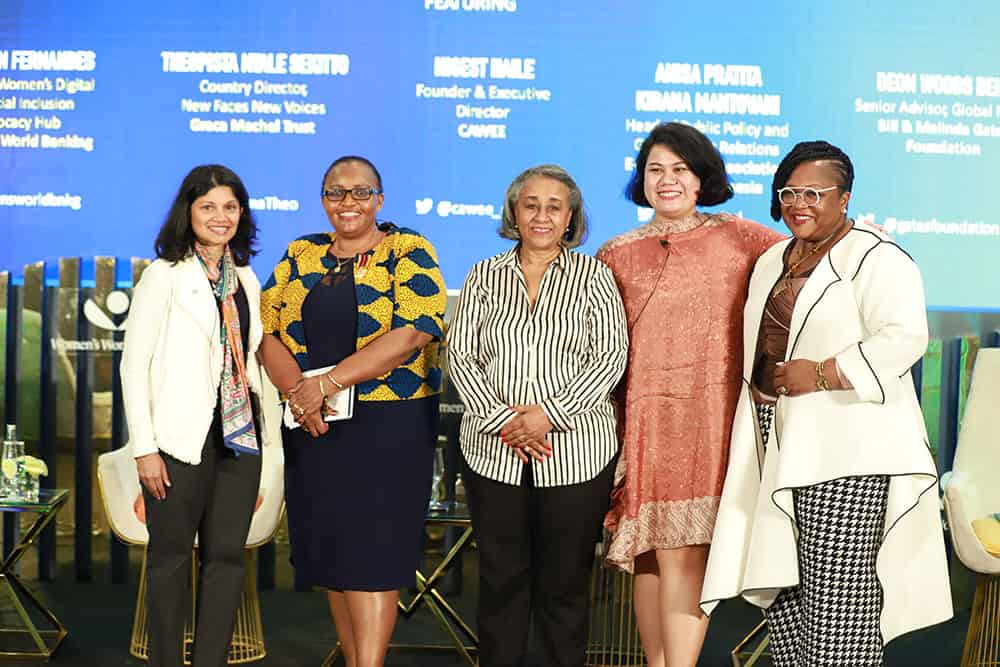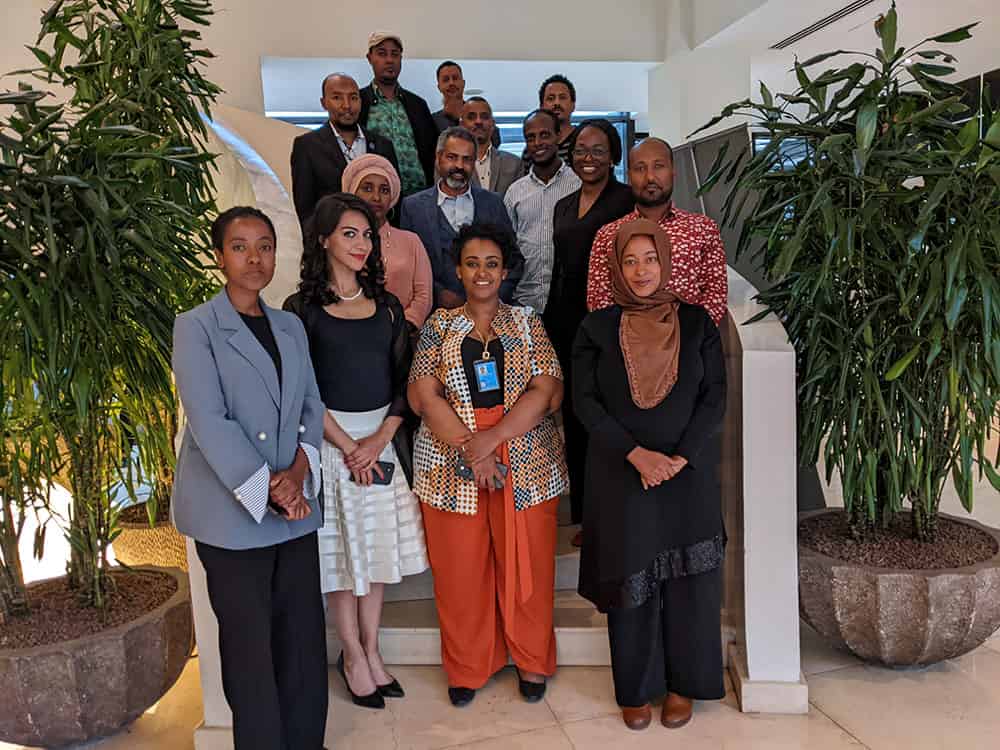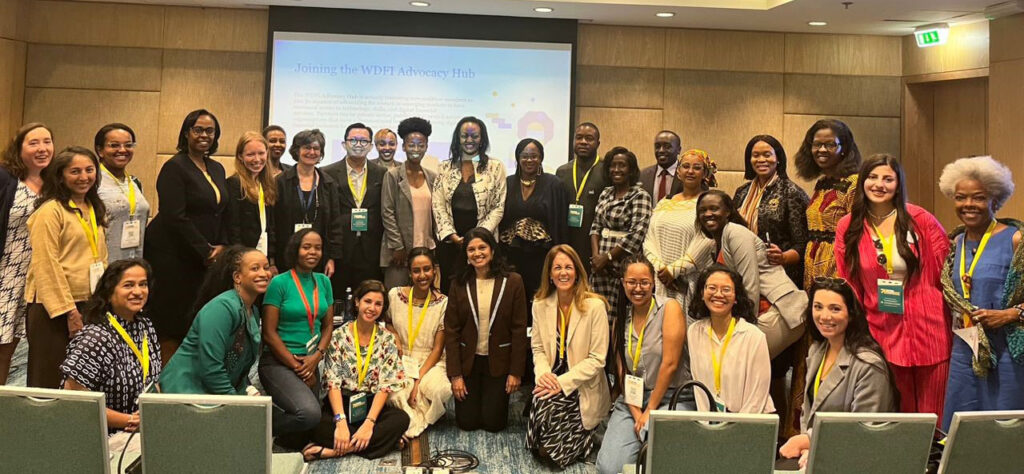The Women’s Digital Financial Inclusion (WDFI) Advocacy Hub, launched in July 2022, is a catalyst for collective action joining together public and private sector organizations to accelerate progress in women’s digital financial inclusion. At the start of 2024, we are looking back at our first full year and the progress we have made towards financial equality.
The Advocacy Hub includes 1) members from across the globe who are driving initiatives to accelerate WDFI, and 2) members from two proof of concept markets, Indonesia and Ethiopia, where we have piloted a Global South-led advocacy approach. With 80 members, we pushed for greater women’s digital financial inclusion across the world by highlighting the importance of building digital financial capability and closing the digital divide.
Making Progress on Closing the Digital Financial Inclusion Gender Gap
In January, Women’s World Banking President and CEO Mary Ellen Iskenderian discussed women’s digital financial inclusion at World Economic Forum when she spoke on the panel, “Women’s Economic Power: Unlocking its Untapped Potential to Tackle a Fragmented World,” hosted by the Bill & Melinda Gates Foundation.
In February, coalition members joined global leaders in Barcelona to highlight the importance of access to technology at Mobile World Congress, hosted by GSMA. Women are 19% less likely than men to use mobile internet, 7% less likely to own any type of phone and 17% less likely to own a smartphone. At Mobile World Congress, we called on the mobile industry to ensure women have access to technology, especially smart phones, which give them access to financial services and let them fully participate in the economy.
The World Bank Group and Women’s World Banking co-hosted a webinar in Indonesia on International Women’s Day to increase awareness of the importance of women MSMEs mastering digital technology, sharing success stories, and encouraging multi-sectoral collaboration to increase women’s capacity.
During the 67th Commission on the Status of Women, coalition members virtually convened for the side event, “Skills and Technology for Digital Financial Inclusion: A focus on women-led MSMEs.” Representatives from the Indonesia, Ethiopia, and global coalitions shared the challenges and opportunities that access to skills, technology, and digital financial services present for women in their regions. One of the major reflections from the webinar was for local and global partners to collaborate on accessing investment opportunities, leveraging each other’s learnings, and mobilizing resources to design products that meet women’s financial needs.
In May, coalition members attended Women’s World Banking’s Making Finance Work for Women Summit (MFWW) in Mumbai, which brought together financial inclusion leaders from around the globe to accelerate action. 250 leaders in the financial services, investor, philanthropy, policy, and technology communities came together to explore innovative ways to economically empower all women through financial inclusion. Coalition members Graça Machel Trust, CAWEE (Center for Accelerated Women’s Economic Empowerment), and idEA (Indonesia E-Commerce Association) participated on a panel to identify barriers and solutions, and called upon the audience to take action within and beyond their own borders.

As a part of the MFWW Thought Leadership Series, coalition members came together for the webinar, “Solutions to Address the Mobile Internet Gender Gap,” which sought to raise awareness and share solutions for the mobile gender gap and the barriers to women’s digital and financial inclusion. The webinar also built momentum for the launch of coalition member GSMA’s Mobile Gender Gap Latest Data – 2023.
In June, the UN Capital Development Fund hosted a media workshop in Ethiopia, which aimed at sharing information with the media on the ability of digital financial services to transform lives. We highlighted how this is especially important for women who are yet to fully embrace mobile money and have no bank accounts, as banks have for years been perceived as ‘male-dominated’ havens. 13 journalists, representing major national, public, and private broadcasters, attended the workshop.

In July, we attended the Women Deliver conference in Kigali, where we held the side event, “Accelerating Women’s Economic Growth through Digital Financial Inclusion.” The panel included perspectives from Indonesia (AFTECH), Ethiopia (Addis Powerhouse), Rwanda (Kosmotive, representing Graça Machel Trust’s New Faces New Voices), Africa (AfricaNenda), and Latin America (Pro Mujer), which enabled a global conversation and brought our advocacy efforts to new audiences across the gender equality movement.

Women Deliver marked the official kick-off of the WDFI Advocacy Hub’s marquee 2023 campaign, which aimed to raise awareness among key stakeholders about the benefits of building digital financial capability (DFC) for women. This global and regional campaign showed how DFC with a focus on gender can pave the way to women’s economic empowerment. The open letter written for the campaign launched during UN General Assembly and focused on the actions governments, financial service providers, and civil society organizations can take to promote building DFC, and garnered 75 signatures – make sure to add yours!
The Hub also supported a high-profile event during United Nations General Assembly hosted by the Permanent Mission of Ethiopia to the UN, in collaboration with the UN Better Than Cash Alliance, Bill & Melinda Gates Foundation, Generation Equality Forum, UN Capital Development Fund, the Office of UN Secretary-General’s Special Advocate for Inclusive Finance for Development, UN Women, Women’s World Banking, Women’s Digital Financial Inclusion Advocacy Hub, and the World Bank Group. The event featured prominent speakers from Ethiopia, Rwanda, the Philippines, Indonesia, and UN OCHA sharing how they have implemented successful policies on financial equality for women.
In November, coalition members participated in an interactive workshop, “Designing for Change: Women-Centered Design in Action.” It familiarized organizations with Women’s World Banking’s innovative methodology to design for gender inclusivity. As a result, they gained clearer insights into the distinct challenges, behaviors, and needs of women, allowing for more effective design of financial products and services tailored to them.
Finally, in December, the Indonesian coalition celebrated the signing of a joint commitment by four key ministries (Ministry of Women’s Empowerment & Child Protection, Coordinating Ministry for Economic Affairs, Coordinating Ministry for Human Development & Culture, Ministry of National Development Planning). This historic commitment underscores the Indonesian government’s dedication to fostering a supportive ecosystem for an inclusive financial industry catering to the unique needs of women.
Looking Ahead
There are still nearly one billion women around the world who are unserved or underserved by the formal financial sector and unable to reach their full economic potential. We hope you’ll join us by doing your part in 2024 to help close the gender gap. Our focus for much of the first half of 2024 will be our advocacy campaign, which aims to bridge the gap in access to and usage of digital financial services by women. Targeting policymakers, financial service providers, and civil society organizations, the campaign emphasizes collaboration and advocacy for tailored financial products, consumer protection, and inclusive policies. With specific calls to action for each audience, the campaign seeks to amplify success stories globally while focusing on regional impact. Through strategic engagements at key moments, the Hub aims to increase awareness, engagement, and measurable outcomes, pushing for a more inclusive financial ecosystem.



